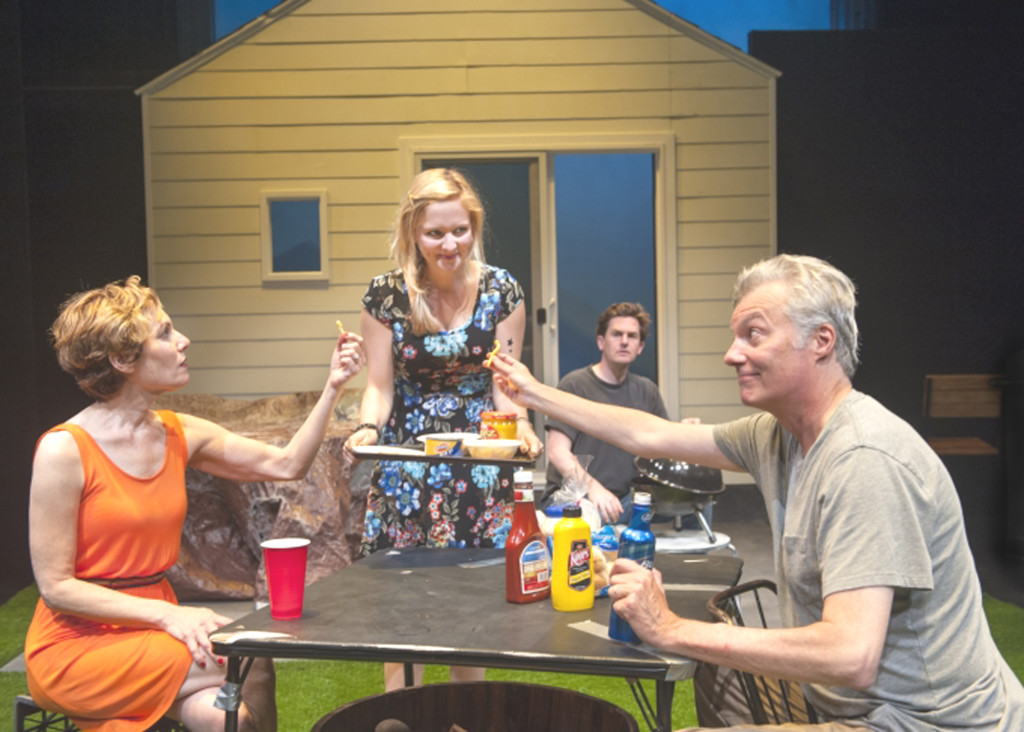
NEW NEIGHBORS get acquainted in “Detroit,” at the Aurora Theatre in Berkeley through July 19.
David Allen photos
The play isn’t exactly about the city of Detroit. “To me, it’s about a particular anxiety the name of that city evokes,” D’Amour explains. “Detroit is a symbol of the (decaying) American Dream.” In her play, two couples make an effort to get to know each other on a comfortably superficial level, all behaving as if they are living perfectly normal and contented lives — until each in turn starts dropping bombs of social impropriety.
Kenny (Equity actor Patrick Kelly Jones) tries hard to get Sharon (Luisa Frasconi) to see the look he’s shooting her way when she starts making references to the rehab program from which the two recently graduated. Just a few moments later, host Ben gets a real “evil eye” from his wife when he just as casually blurts out that the two of them don’t have any friends. That one is followed by the first of many awkward conversational pauses.
“So that’s why you’re not drinking,” Ben chimes in after Sharon leaks Kenny’s guarded secret, trying his best to make light of the slip and assure the new neighbors that they will not be judged. Later that night, Mary hopes her counterpart will be equally understanding when she wakes Sharon up in the wee hours, crying about nothing and everything until Sharon bluntly asks if Mary has ever sought help for her drinking problem.
The entire play takes place in the neighbors’ backyards. More and more truths are revealed a gathering at a time as the new friends grow more excited about their blossoming relationship. In fact, they are quickly carried away to a point where nurturing those new-formed friendships becomes an all-encompassing goal, ultimately leading them down an unexpectedly dangerous path.The ending is perhaps the most important part of the play and I wouldn’t want to spoil it, so I apologize if I sound overly cryptic here when I say that even after all is revealed to them, the characters remain reluctant to recover from their ecstatic but ultimately disastrous pursuits. Nobody wants to face the reality that their hearts’ desires have long been neglected in favor of some elusive and deceptively superficial American dream.
“Detroit” paints a strange, distorted picture of modern life, something that is at once intuitively familiar and uncomfortably strange. Highly creative director Josh Costello has a deft hand, but it may be all too carefully executed, attempting to spell out every nuance. The result feels fresh and surprising but also incomplete, as if only the most astute observer could comprehend all of its meaning at once.
The play is loaded with symbolism and metaphors great and small, and it’s fun when they become apparent as the story progresses. It’s a kind of literary geometry in that sense, many forms appearing with varying size and scope within the overall framework.
“Detroit” is a voyage of discovery. There are laughs throughout as the neighbors commit their social faux pas, but I found the story fundamentally tragic and the dramatic treatment sedate rather than satirical. This may be a perspective puzzle in that sense, too. Depending on the experiences audience members bring to the production, each may come away with a dramatically different impression.
Go with a spirit of curiosity, and expect to be surprised and confused. It’s just that kind of play.
If You Go
“Detroit” continues at the Aurora Theatre, 2081 Addison St., Berkeley through July 19. Tickets are $32 to $50 and are available by calling 510-843-4822 or online at auroratheatre.org.
Elizabeth Warnimont is a freelance writer specializing in the performing arts. She is also a substitute teacher for the Benicia Unified School District.







Leave a Reply